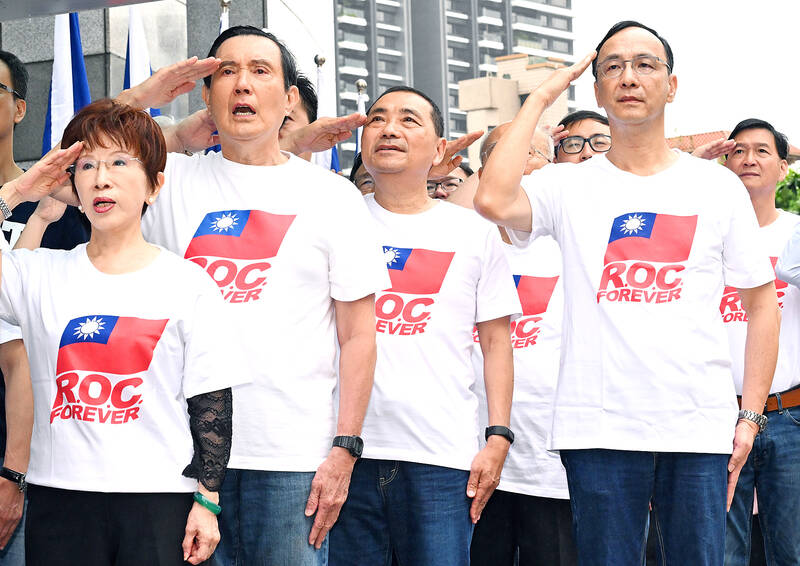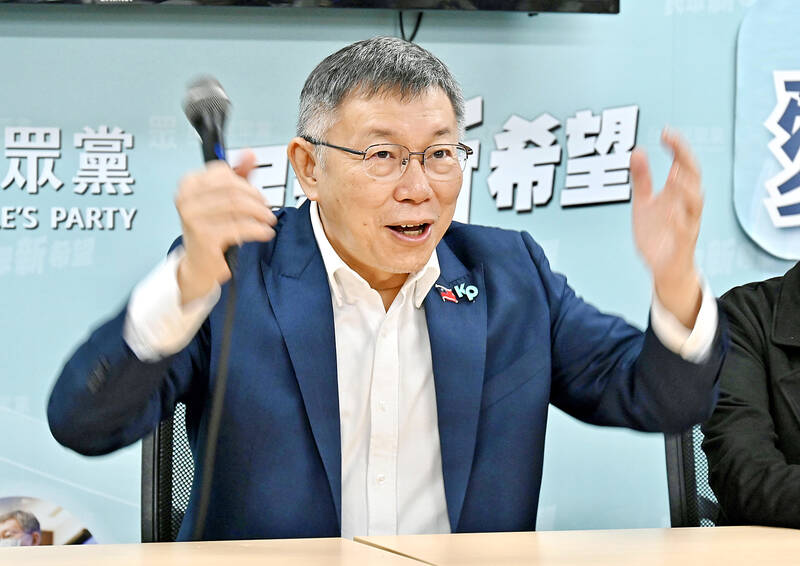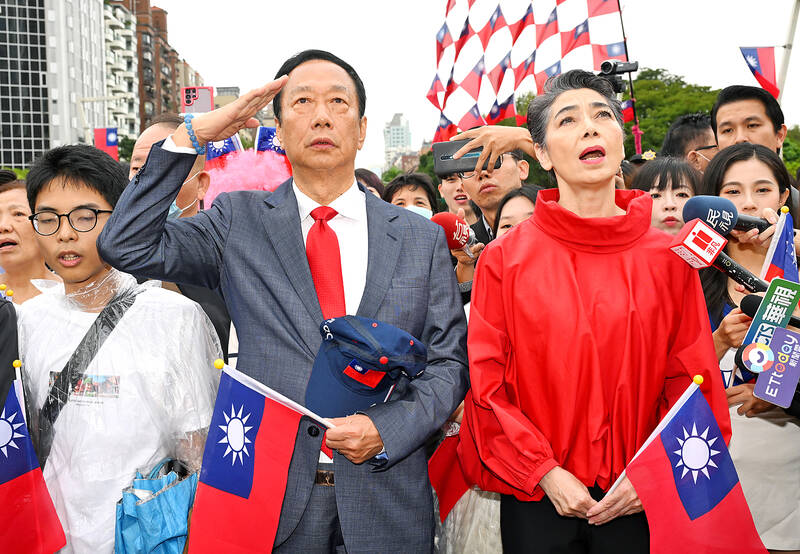The government owes the public an apology for its failures over the past seven years and President Tsai Ing-wen’s (蔡英文) Double Ten National Day address was “arrogant from start to finish,” the Chinese Nationalist Party (KMT) said in a statement yesterday.
Tsai’s speech “creates a grand satire of the people’s impoverishment and the threat of war,” the KMT said.
The domestic policy achievements Tsai touted in her speech were failures, it said, adding that lives were lost needlessly in the COVID-19 pandemic, controversy surrounded the indigenous submarine program, public servants were “defamed” due to pension reform and there have been numerous power outages.

Photo: Lien Cheng-hui, Taipei Times
Instead of facing her poor domestic record, Tsai leaned on her diplomatic performance, utilizing “illusory intellectual language” to whitewash her lack of achievement, it said.
The international standing of the Republic of China (ROC) has actually diminished during the seven years under the Democratic Progressive Party (DPP), the KMT said, citing nine diplomatic allies that cut official ties and failure to secure invitations to the World Health Assembly and International Civil Aviation Organization.
The DPP administration brought cross-strait relations to their coldest point in 20 years, it said, adding that its policies are the main reason that Taiwanese face the threat of war.

Photo: Tu Chien-rong, Taipei Times
Voters should usher in a change of power, as allowing the DPP to continue “would not only harm the ROC, but also the future of 23 million Taiwanese, and of global peace and stability,” it added.
Earlier yesterday, the KMT held its own flag-raising ceremony at its headquarters in Taipei, as party heavyweights joined former president Ma Ying-jeou (馬英九) in boycotting the government’s Double Ten National Day event over the use of “Taiwan” in its English title.
Ma, KMT Chairman Eric Chu (朱立倫), New Taipei City Mayor Hou You-yi (侯友宜) and Taipei Mayor Chiang Wan-an (蔣萬安) were among the party members at the morning event before they attended ceremonies in other areas governed by the KMT.

Photo: Tien Yu-hua, Taipei Times
Taiwan People’s Party Chairman Ko Wen-je (柯文哲), KMT Legislator Sufin Siluko (廖國棟), New Power Party Chairwoman Claire Wang (王婉瑜) and People First Party Chairman James Soong (宋楚瑜) participated in the main flag-raising ceremony outside the Presidential Office Building in Taipei.
Vice President William Lai (賴清德) vowed in a post on Facebook in response to Tsai’s final National Day speech as president to keep Taiwan peaceful, democratic and prosperous.
Lai is the DPP’s presidential nominee and the frontrunner in next year’s election, according to opinion polls.
The DPP is a responsible ruling party dedicated to stable development, and one that remembers its mission and values, Lai wrote, adding that the nation is walking on the right path thanks to the shared labor of 23 million Taiwanese.
Lai agreed with the formula to maintain peace Tsai spoke about, saying that fostering Taiwan’s international stature, solidifying a national consensus for dealing with Beijing and developing a mutually acceptable framework of interaction would be the keys to peaceful coexistence.
The nation remains committed to enabling both sides of the Taiwan Strait to become contributors to peace and stability in the region, he said.
Under his leadership, Taiwan would emphasize solidarity between democratic forces, solidarity across the political divide and solidarity with the global alliance for democracy in continuation of the president’s “four commitments,” Lai wrote.
Tsai’s four commitments are to maintain a free and democratic constitutional system, ensure Taiwan and China will not be subordinate to each other, resist annexation or encroachment on national sovereignty, and guarantee that Taiwanese alone will decide the nation’s future.
Lai reiterated that military deterrence, economic security, partnerships with other democratic countries, and principled and firm leadership would be the basis of Taiwan’s national security if he is elected.
“Supporters of Taiwan and the Republic of China must band together under the common denominator of national consensus of the Republic of China, Taiwan to safeguard our free and democratic way of life,” he wrote.
The guidance of the DPP government in the past seven years was not free of mistakes, but it has corrected all its errors with all possible haste in a spirit of gratitude for its supporters and critics, Lai said.
The National Hope Project of his campaign platform would seek to transform emerging challenges into opportunities for the nation to stay on its path of a free, democratic, prosperous and just society, he said.
Separately, Ko, the TPP’s presidential candidate, said that Taipei’s professed dedication to the “status quo” is at odds with its accusations that its opponents are colluding with China.
The part of Tsai’s speech he most agreed with was the last segment, in which the president affirmed that she would step down next year and that the nation would live on, Ko said.
Hon Hai Precision Industry Co founder Terry Gou (郭台銘), an independent presidential candidate, also attended the main ceremony.
The signatures his campaign has garnered to launch his presidential bid are evidence that Taiwanese are tired of conventional politics and want a government with an enterprising spirit, Gou told reporters on the sidelines of the ceremony.
For numerous Taiwanese businesspeople living abroad and other expatriates, the nation’s flag and anthem are a reminder of home, and an exhortation that they and their compatriots must strive side-by-side toward a better future, he said.
The honor and unity behind these symbols of the nation enabled Taiwan to prevail against challenges and build its high-tech economy, which helps protects its sovereignty, he said.
A renewed spirit is needed to overcome the crisis of energy transition and artificial intelligence the nation faces, Gou said.
“I salute the martyrs of the revolution, the hardworking civil servants and all my fellow citizens with my most sincere respect in our common pursuit to realize a peaceful, prosperous and honestly governed Taiwan,” he said.
Additional reporting by Lin Che-yuan and CNA

Chinese Nationalist Party (KMT) Chairman Eric Chu (朱立倫), spokeswoman Yang Chih-yu (楊智伃) and Legislator Hsieh Lung-chieh (謝龍介) would be summoned by police for questioning for leading an illegal assembly on Thursday evening last week, Minister of the Interior Liu Shyh-fang (劉世芳) said today. The three KMT officials led an assembly outside the Taipei City Prosecutors’ Office, a restricted area where public assembly is not allowed, protesting the questioning of several KMT staff and searches of KMT headquarters and offices in a recall petition forgery case. Chu, Yang and Hsieh are all suspected of contravening the Assembly and Parade Act (集會遊行法) by holding

PRAISE: Japanese visitor Takashi Kubota said the Taiwanese temple architecture images showcased in the AI Art Gallery were the most impressive displays he saw Taiwan does not have an official pavilion at the World Expo in Osaka, Japan, because of its diplomatic predicament, but the government-backed Tech World pavilion is drawing interest with its unique recreations of works by Taiwanese artists. The pavilion features an artificial intelligence (AI)-based art gallery showcasing works of famous Taiwanese artists from the Japanese colonial period using innovative technologies. Among its main simulated displays are Eastern gouache paintings by Chen Chin (陳進), Lin Yu-shan (林玉山) and Kuo Hsueh-hu (郭雪湖), who were the three young Taiwanese painters selected for the East Asian Painting exhibition in 1927. Gouache is a water-based

Taiwan would welcome the return of Honduras as a diplomatic ally if its next president decides to make such a move, Minister of Foreign Affairs Lin Chia-lung (林佳龍) said yesterday. “Of course, we would welcome Honduras if they want to restore diplomatic ties with Taiwan after their elections,” Lin said at a meeting of the legislature’s Foreign Affairs and National Defense Committee, when asked to comment on statements made by two of the three Honduran presidential candidates during the presidential campaign in the Central American country. Taiwan is paying close attention to the region as a whole in the wake of a

OFF-TARGET: More than 30,000 participants were expected to take part in the Games next month, but only 6,550 foreign and 19,400 Taiwanese athletes have registered Taipei city councilors yesterday blasted the organizers of next month’s World Masters Games over sudden timetable and venue changes, which they said have caused thousands of participants to back out of the international sporting event, among other organizational issues. They also cited visa delays and political interference by China as reasons many foreign athletes are requesting refunds for the event, to be held from May 17 to 30. Jointly organized by the Taipei and New Taipei City governments, the games have been rocked by numerous controversies since preparations began in 2020. Taipei City Councilor Lin Yen-feng (林延鳳) said yesterday that new measures by